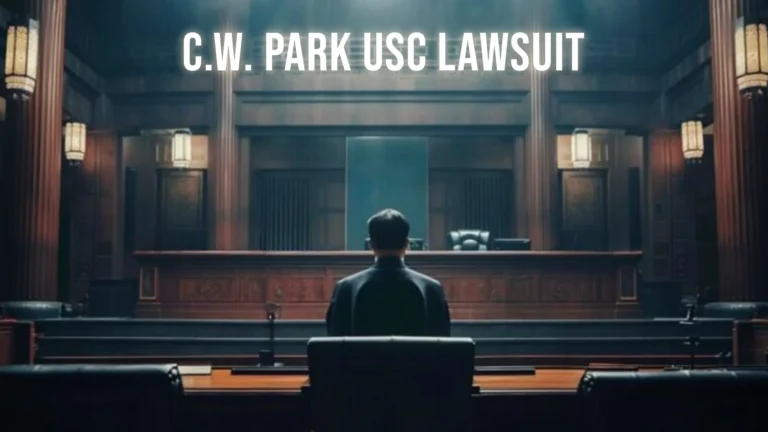The lawsuit involving C.W. Park USC Lawsuit and the University of Southern California (USC) has captured considerable attention due to its implications for higher education and legal accountability. This comprehensive article delves into the major developments of the case, providing a detailed overview of the situation, the legal arguments, and the potential consequences for all parties involved.
TRENDING
Prekldača: Essential Guide To Understanding And Using It
Background Of The Lawsuit
The Parties Involved
The lawsuit centers on C.W. Park, an individual who has brought legal action against USC. The specifics of Park’s claims involve allegations against the university, and understanding these claims requires a look at both the background of Park and the nature of USC’s response.
Allegations Against USC
C.W. Park’s lawsuit alleges that USC engaged in misconduct that has significant legal and ethical implications. These allegations are not only about direct actions by the university but also about systemic issues within its administration.
Major Developments In The Case
Recent Court Rulings
One of the key recent developments in the lawsuit is the series of court rulings that have shaped the direction of the case. Recent rulings have included:
Denial of USC’s Motion to Dismiss: The court’s decision to deny USC’s motion to dismiss the case means that the lawsuit will proceed to trial, allowing the claims to be heard in a court of law.
Discovery Phase Developments: During the discovery phase, both parties have exchanged evidence and information. This phase has revealed significant details about USC’s internal processes and the nature of the allegations.
Pre-Trial Motions: Both parties have filed various pre-trial motions, including requests for summary judgment and motions to exclude certain evidence. The court’s decisions on these motions have influenced the strategies of both sides.
Settlement Talks
Settlement negotiations have been a significant aspect of the case, with both parties exploring the possibility of resolving the dispute outside of court. These talks are often complex and involve extensive negotiation over terms and conditions.
Media Coverage and Public Reaction
The case has garnered widespread media attention, which has influenced public perception and pressure on both parties. Media coverage has ranged from detailed analyses of legal arguments to broader discussions about the implications of the lawsuit for higher education.
Legal Arguments And Strategies
C.W. Park’s Legal Strategy
C.W. Park’s legal team has focused on several key arguments:
Breach of Contract: Park argues that USC failed to uphold its contractual obligations, which has resulted in significant harm.
Negligence and Misconduct: The lawsuit claims that USC’s actions were negligent and demonstrated a lack of proper oversight and accountability.
Damages and Compensation: Park is seeking damages for the harm caused by USC’s alleged misconduct, including compensation for emotional distress and financial losses.
USC’s Defense Strategy
USC has mounted a robust defense against the allegations:
Denial of Allegations: USC denies all allegations of wrongdoing, arguing that it has acted within the bounds of legal and ethical standards.
Challenge to Evidence: The university has challenged the admissibility and relevance of some of the evidence presented by Park’s legal team.
Counterclaims: USC has also filed counterclaims against Park, alleging that the lawsuit is baseless and seeks to deflect attention from other issues.
Implications Of The Lawsuit
For USC
The outcome of the lawsuit could have significant repercussions for USC:
Reputation Damage: A ruling against USC could damage its reputation and affect its standing among prospective students and faculty.
Financial Consequences: If the court rules in favor of Park, USC may face substantial financial penalties and compensation claims.
Policy Changes: The lawsuit could lead to changes in university policies and practices, particularly regarding oversight and accountability.
For Higher Education
The case also has broader implications for the higher education sector:
Legal Precedents: The lawsuit could set important legal precedents regarding the responsibilities and liabilities of educational institutions.
Policy Reforms: It may prompt reforms in how universities handle similar issues, affecting practices across the sector.
Public Trust: The case could impact public trust in higher education institutions and their ability to address complaints and allegations.
Conclusion
The C.W. Park vs. USC lawsuit is a significant legal battle with wide-ranging implications. As the case progresses, its outcomes will be closely watched by legal experts, educational institutions, and the public. The developments in the case highlight crucial issues about accountability, transparency, and the responsibilities of higher education institutions.
ALSO READ: MySDMC SSO Login Made Simple: A Step-By-Step Guide
FAQs
What is the C.W. Park USC lawsuit about?
The C.W. Park USC lawsuit involves allegations by C.W. Park against the University of Southern California, claiming misconduct and breach of contract. The case focuses on whether USC failed in its legal and ethical obligations, with Park seeking damages for alleged harm.
What recent developments have occurred in the case?
Recent developments include the denial of USC’s motion to dismiss the case, revelations from the discovery phase, and ongoing settlement talks. Pre-trial motions have also influenced the case’s trajectory.
How is USC defending itself against the allegations?
USC is defending itself by denying the allegations, challenging the evidence presented, and filing counterclaims against Park. The university argues that it has acted appropriately and that the lawsuit is without merit.
What are the potential consequences for USC if the lawsuit is not resolved in its favor?
If USC does not prevail, it could face reputational damage, financial penalties, and potential changes to its policies and procedures. The lawsuit could also lead to increased scrutiny and impact the university’s future operations.
How might the lawsuit impact other educational institutions?
The lawsuit could set legal precedents that affect how other educational institutions handle similar issues. It might prompt policy reforms and influence public trust in higher education institutions.

